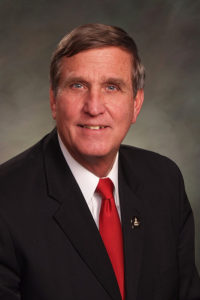
An Interview with Catherine Strode
One of the state’s most vocal political opponents of legalized marijuana has helped pass a bill to allow pharmacies to dispense pharmaceutical marijuana. State Senator John Cooke, a retired sheriff from Weld County, pulls no punches in saying he believes marijuana to be a ‘scourge’ on the state. However, he has cosponsored and helped pass House Bill 18-1187 that makes a technical fix to Colorado pharmacy law that prevents pharmacies from dispensing drug products that contain marijuana or marijuana concentrate.
In an interview with Catherine Strode, Senator Cooke says his sponsorship of HB18-1187 is an attempt to aid children suffering from severe forms of epilepsy. The Food and Drug Administration (FDA) is currently reviewing a drug containing cannabidiol (CBD) to treat a rare form of resistant pediatric epilepsy called Epidiolex. With the passage of HB18-1187, Colorado parents can obtain cannabidiol to treat the disease if approved by the FDA.
Why do you think we need this bill to get FDA approved Cannabis in the state?
“Right now, pharmacies in the state of Colorado are not allowed to sell anything that has cannabis or cannabidiol in it. It has to have the FDA approval in order for us to change the law to allow them to sell it in pharmacies. The marijuana industry says it is a medicine. My belief is (and I have believed this of medical marijuana ever since it was passed by the voters), if it is a medicine it should go thru FDA trials. In that way, we can prove what’s medicine and what’s not. It’s been going through the trials for about seven years so they have already been working on this. Then they can sell it in pharmacies.
Will this bill change access to other products derived from marijuana?
“No, not at all. The way it works in Colorado, pharmacies cannot sell any drug that has cannabis in it or is made from cannabis. Dispensaries aren’t allowed to sell FDA drugs. This just gives people more of a choice. The CBD does not have any Tetrahydrocannabinol (THC) in it. The THC is the hallucigen. It’s not synthetic because it’s made from the marijuana plant. They take out all of the THC. People still have the option of going to a medical marijuana dispensary to get what they have always had if they want it.”
What is your opinion about medical marijuana?
“I will be up front with you. I do not like the marijuana industry. I think it is a scourge on the state of Colorado to be quite honest. I have always said if it’s medicine, let’s prove it. Let’s have the FDA trials. They kind of threw my words back in my face. I need to at least support the bill to see if the FDA is going to approve the drug. I have always believed it is not (medicine.) When medical marijuana first came in, a large proportion of the people who had medical cards were 24-year-old males with back pain. It’s a farce. Maybe there is some legitimate purpose for it for medicine other than, ‘Hey I smoke dope and I feel better,’ kind of a thing. If it is medicine, and the FDA approves it, then let’s get it in the pharmacies. Let’s get it regulated through the FDA in pharmacies, as opposed to Head Shops.”
Why do you think marijuana legalization is a scourge on the state?
“I was the sheriff of Weld County for 12 years. Law enforcement came out against it. I think medical marijuana was the camel’s nose under the tent to get recreational marijuana. You see what downtown Denver looks like with all these homeless bums coming into Colorado to smoke dope. I think it has been a bad thing for Colorado. People say, ‘It’s marijuana. I smoked marijuana when I was in college.’ Well 30, 40 years ago, it was mostly ditch weed and it was pretty weak. Now it’s potent. Emergency room admissions have skyrocketed for overdosing. Instances of driving on drugs have increased. The number of kids using marijuana underage in our schools has increased. I just think marijuana is a bad thing for our society.”
Yet, ironically, you have helped pass this bill supporting a drug that contains CBD. Why?
“If the FDA approves it, the impact would be kids living longer. They have shown in trials in England where it (CBD) has stopped all seizures. We are talking about seizures, sometimes, of over a hundred a day. There are two really rare forms of epilepsy that other drugs haven’t helped and they are still having seizures. Clinical tests are showing this drug (CBD) has a high rate of success. In one of those conditions, it has over a 45 per cent success rate. The other one is not as high. It’s a little bit lower. It’s a last resort for some of these kids. Often times these kids with epileptic seizures do not live past 16 or 17 years old. Maybe we can extend the lives of these children and have a better life for them.”
 Catherine Strode is Advocacy Denver’s Communications and Policy Specialist. She holds a Masters degree in Public Administration with an emphasis in Health Care Policy. Catherine publishes Policy Perspective, featuring interviews with state policy makers on issues that affect the work and mission of Advocacy Denver.
Catherine Strode is Advocacy Denver’s Communications and Policy Specialist. She holds a Masters degree in Public Administration with an emphasis in Health Care Policy. Catherine publishes Policy Perspective, featuring interviews with state policy makers on issues that affect the work and mission of Advocacy Denver.
